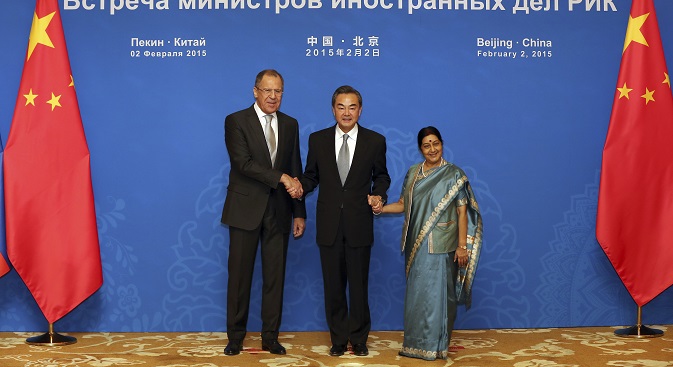
Sergei Lavrov, Wang Yi (c) and Sushma Swaraj.
APWhen India’s External Affairs Minister Sushma Swaraj arrives in Moscow from Tehran for a meeting with her counterparts from Russia and China next Monday (April 18), she is going to raise two particular issues in the trilateral forum.
The first relates to terrorism, which is part of the Russia India China trilateral group’s ambit. Specifically, she will raise the issue of Masood Azhar, head and founder of a Pakistani group called the Jaish-e-Mohammad (JEM), which India blames for attacks on its air force base at Pathankot in January. India had applied to the United Nations to have him designated a global terrorist but the request was vetoed earlier this month by China. The U.N. has banned the JEM, but efforts to designate its head as a terrorist have twice failed, on account of China. Sources said Swaraj would raise the issue with Sergey Lavrov, Russia’s Foreign Minister, and Chinese Foreign Minister Wang Yi, within the trilateral meeting and in bilateral meetings with both men.
In a joint communiqué issued after the last RIC meeting in Beijing last year, Lavrov, Wang and Swaraj had agreed that “terrorism in all its forms and manifestations committed by whomever, wherever, and for whatever purposes, is a threat to international peace and security, a grave violation of human rights and a crime against humanity. The Ministers affirmed the need for all countries to join efforts in combating terrorism under the auspices of the United Nations, in accordance with the UN Charter and principles and norms of international law and for the robust implementation of relevant UN Security Council resolutions and the Global Counter-Terrorism Strategy… The Ministers reiterated that there can be no ideological, religious, political, racial, ethnic, or any other justification for acts of terrorism,” the communique said.
Swaraj is likely to raise the issue of Azhar, whom India calls a terrorist, in this context, sources said.
Foreign Minister Lavrov is likely to give his Indian and Chinese colleagues a detailed briefing on the current situation in Syria, and progress against ISIS, until and after Russia withdrew its forces from there. The three ministers in Moscow will also discuss ways to curb the spread of ISIS towards Central Asia and South Asia.
India, Russia and China, like Afghanistan, have been targets of terrorist attacks, and remain concerned about the growing threats of terrorism, radicalism and criminality that primarily destabilize Afghanistan but also threaten to undermine regional peace and stability.
The other issue Swaraj will raise is the idea of expanding the membership of the Quadrilateral Coordination Forum (QCF) dialogue on Afghanistan, to include Russia and India and Iran. Swaraj will be visiting Tehran immediately prior to her visit to Moscow.
India hopes that the QCF dialogue on Afghanistan, which now includes Pakistan, Afghanistan, USA and China, can be expanded to include India, Russia and Iran in the process.
While Pakistan is vigorously opposed to the idea of India being part of any process or dialogue to resolve the future of Afghanistan, India already has a bilateral dialogue mechanism process on Afghanistan going with Russia, China and the United States.
India is also the first country with which Afghanistan signed a comprehensive Strategic Partnership Agreement (SPA), in 2011.
Richard Olson, the U.S. Special Representative on Afghanistan was in New Delhi earlier this week to brief the Indian leadership about the situation in that country, ahead of a key meeting of the QCF, due this week. The Taliban has rejected requests to come to the negotiating table, so discussions will focus on strategies to bolster the Afghan National Army, which has suffered enormous losses (5500 dead and 14,000 injuries) over the past year. Sources said that Washington was on board with the idea of expanding the membership of the quadrilateral, to include New Delhi.
Chinese Foreign Minister Wang would be in a position to brief his counterparts in Moscow next Monday, about the outcome of the QCF’s discussions on Afghanistan.
In their joint communiqué issued after their meeting in 2015, the RIC foreign ministers “supported the political transition in Afghanistan …from International Security Assistance Force (ISAF) to the Afghan National Security Forces (ANSF). The security transition should be accompanied by adequate measures for increasing the ANSF capacity so that the ANSF should be capable to provide security for all the country and population of Afghanistan. The Ministers affirmed their support for broad and inclusive peace and reconciliation in Afghanistan that is Afghan-led and Afghan-owned, as well as to help Afghanistan’s integration into the region through its expanded trade and transport networks and regional connectivity. The Ministers stressed that it is important for the international community to remain engaged in Afghanistan and fulfill its long-term commitments on civilian and security assistance,” the statement said.
"India attaches importance to RIC ministerial meeting that allows the three countries to exchange views and coordinate their positions on international and regional issues of mutual importance," Vikas Swarup, India’s foreign ministry spokesman said.
During her Moscow visit, Swaraj will also meet Russian Deputy Prime Minister Dmitry Rogozin, who is co-chair of the India-Russia inter-governmental commission on trade and economic cooperation, to take stock of the developments in strengthening this important aspect of the bilateral relationship.
"She will also meet Russian Foreign Minister Sergei Lavrov to take stock of the overall bilateral relationship," Swarup said.
Though Russia, India and China also cooperate within the BRICS grouping, the RIC strategic triangle provides another forum for three of the world's powerful countries to work together as important global economic and strategic powerhouses.
All rights reserved by Rossiyskaya Gazeta.
Subscribe
to our newsletter!
Get the week's best stories straight to your inbox